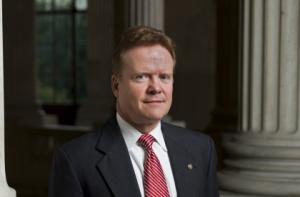The fight to stop the drug war has entered its possibly most critical time to date, a time of major challenges but also unprecedented opportunities. We need your help today to decide whether StoptheDrugWar.org can enter this moment at full strength.
The Obama administration's increasingly hostile approach to medical marijuana distribution in California brought out protestors by the hundreds as the president went to San Francisco for a fundraiser.
It looks like Canada's Conservative government is finally going to get the ugly crime bill it has long wanted. That will mean mandatory minimums for growing as few as six marijuana plants.
A Florida federal district court judge has issued a temporary restraining order blocking Florida's welfare drug testing program.
Senate Republicans have blocked an amendment that would have passed Sen. Jim Webb's National Criminal Justice Commission Act, warning hyperbolically that it would violate states' rights.
A pair of Bay area state legislators are blasting the federal government for its California medical marijuana crackdown and saying they could craft a legislative fix if the Justice Department cooperates.
There could be a California initiative to bring statewide regulation to medical marijuana next year, organizers said Tuesday.
Colombia's president says the world should legalize marijuana, but don't look for his country to lead the way.
Somebody attacked Mexican army troops in Monterrey with a car last week, and that's just the tip of the iceberg in the ongoing wave of prohibition-related violence in Mexico.
A Pittsburgh-area man has become the third person to die from swallowing drugs during a bust in recent weeks and the 41st to die so far this year in US domestic drug enforcement operations.
A Texas DA gets greedy, and so do a California narc, a California prison worker, a Washington state evidence clerk, and a Washington, DC, police officer.
Every two years drug policy reformers from across the United States and around the world come to the International Drug Policy Reform Conference to listen, learn, network and strategize together for change. This year the conference is in Los Angeles, November 2-5, and StoptheDrugWar.org is a partner.
Dear friends of
StoptheDrugWar.org:
We need your help to make some important decisions. The fight to stop the drug war has entered its most critical moment to date:
- Support for marijuana legalization has reached 50 percent. (!)
- Heads of state including the current presidents of Mexico and Colombia have called for alternatives to drug prohibition to be considered.
- Leading civil rights groups have called for an end to the war on drugs in its current form.
- And yet -- and yet -- the federal government under President Obama has escalated its campaign to crush California's medical marijuana industry to its broadest and most aggressive level yet. Will the next shoe drop in other medical marijuana states too?
We need your help to decide whether StoptheDrugWar.org -- our movement-building work; our organizational coalitions; our leading online publications like the Drug War Chronicle newsletter that keep the movement, journalists, policymakers and countless others informed and empowered -- can enter this historical moment at full strength. Will you step up today in meeting both the crisis and the phenomenal opportunities? Please make a generous donation to StoptheDrugWar.org -- non-deductible for our lobbying work, or tax-deductible for our educational work -- to help us make this decision the way it should be made.
Along with these needs of the time, there are some specific reasons we need your help now, rather than December when many people make their donations. One of the reasons is that we need to make a decision over the next two weeks as to whether we can continue to use the high-powered legislative and email list service that has helped us so much during the past two years. Along with reliably delivering our email to all our subscribers -- a tough job in this time of spam and false spam positives -- this system is what's enabled us to launch our major new Legislative Center. If you haven't already, please check out our compilation of hundreds of federal and state bills and votes, legislator scorecards, media and voter registration tools and more. We will not be able to continue this program without your donations.
A second specific need right now is that our blogger, Scott Morgan, has recently been able to return after work on other projects, but we need your support to afford his part-time but critical work on a consistent basis. Scott, recently named the High Times Freedom Fighter of the Month, was the leading voice in the blogosphere for marijuana legalization during the months running up to last year's Prop 19 vote, and he is a regularly reach tens of thousands of readers leading online voice highlighting President Obama's refusal to engage in a serious discussion of the marijuana issue. His posts reach many more on sites like Reddit.com and the Huffington post and citations on major issue blogs like the Daily Dish. Our web site traffic took a hit during his absence, and it's grown again since his return. Scott has always done what he could even when funds were short, but we need to let him know sooner rather than later what our situation is.
Donations to our organization can be made online at http://stopthedrugwar.org/donate, or they can be mailed to: DRCNet Foundation (tax-deductible), P.O. Box 18402, Washington, DC 20036; or Drug Reform Coordination Network (non-deductible for lobbying), same address. (Contact us for information if you wish to make a donation of stock.)
Thank you for standing with us to stop the drug war's cruelties and meet the opportunity this time offers to make a brighter future. And don't get discouraged by the challenges our movement and the cause are currently facing -- time is on our side!
back to top
Hundreds of angry medical marijuana patients and supporters gathered in San Francisco's South of Market Tuesday to greet President Obama as he appeared at a $5,000 a head fundraiser at the W Hotel. They were joined by hundreds of other protestors, mainly Occupy San Francisco members and environmentalists upset with the Keystone pipeline.

Boisterous crowds tried to send the president a message in San Francisco (Image: Phil Smith)
The president never saw the demonstrators -- he entered the building through a back entrance a block away from where protestors had gathered -- but boisterous chants of "DEA, Go Away!" and "Whose State? Our State! Whose Medicine? Our medicine!" echoed through the streets as police watched impassively.
It was the second straight day of medical marijuana protests aimed at the president. He got similar treatment Monday in Los Angeles.
The California medical marijuana community is upset with the president over what it sees as a multi-pronged attack on medical marijuana production and distribution by agencies of the federal government (sometimes in cahoots with recalcitrant local officials). Despite Obama's campaign pledges and the Department of Justice's October 2009 memo directing federal prosecutors to back off from medical marijuana businesses operating in compliance with state law, the pace of DEA raids has only accelerated since he took office in January 2009.
It's not just the DEA. The Department of the Treasury has been going after financial institutions that do business with the medical marijuana industry, forcing banks to submit to onerous record-keeping of their dealings and persuading some of them to drop their medical marijuana customers. Similarly, the IRS has joined the attack, refusing to allow dispensaries to deduct standard business expenses and hitting them with whopping past due tax bills.
Most recently, the four US Attorneys who cover California held a much ballyhooed press conference in Sacramento announcing that they were going after what they described as an industry out of control. They announced a campaign aimed at dispensary and grow operations landlords, sending out a wave of letters threatening property owners with asset forfeiture and even stiff criminal charges if they don't throw out their clients.
But while the feds say they are targeting people who abuse the system for profit, they have recently gone after some of the most respected, regulated and compliant operations in the state. Steve De Angelo's
Harborside Health Center in Oakland is the biggest target of the IRS and was recently handed a $2 million tax bill after its expenses were disallowed; Lynette Shaw's
Marin Alliance for Medical Marijuana is the longest-licensed dispensary in the state and enjoys impeccable relations with local officials, but its landlord was hit with a threat letter; and Matt Cohen's
Northstone Organics Cooperative is the first licensed grow -- with every plant tagged -- under Mendocino County's cutting edge regulatory scheme, but was raided by the DEA earlier this month.

Occupy San Francisco makes an appearance. (Image: Phil Smith)
The effects of the renewed federal campaign of raids and intimidation couldn't be any clearer than the message that now greets visitors to
Northstone's web page. "We are closed due to a federal raid on our farm," the message reads. "The entire crop was eradicated. We are closed until further notice. We will be sending out an e-letter informing memberships of what they can do as well as upcoming protests. We apologize for the inconvenience."
"Contrary to DOJ claims that they are targeting abusive profiteers, their list of targets includes some of the most respected and best regulated facilities in the state," said
California NORML director Dale
Gieringer.
Federal prosecutors are also targeting a trio of San Francisco dispensaries for being within a thousand feet of a school or playground, citing a federal drug-free school zone statute that enhances penalties for drug crimes committed within that forbidden zone. But California law allows dispensaries within 600 feet of schools and playgrounds.
In the case of the two Mission area dispensaries within a thousand feet of a school, the dispensaries operated there before the school arrived, and the school has made it known that it has no problems with them. In the case of the dispensary located near a playground, advocates point out that several bars and sex clubs nearby are in closer proximity to the kids.
"The DOJ's complaints represent a frivolous and cynical attack on land use decisions that properly belong to local government," said
Gieringer. "This is a blatant example of federal government over-regulation run amok."
"It feels a little Kafkaesque," said medical marijuana and legalization proponent state Rep. Tom
Ammiano (D-San Francisco) at a press conference preceding the protest. "We've been sandbagged by US Attorneys acting like thugs. I almost expect a drone to come down on a dispensary in Fresno one of these days," he said, barely cracking a smile.
Ammiano wants a meeting with Department of Justice officials on the issue, he said. "Why don't they lean on the banks for the foreclosures, instead of medical marijuana?" he asked. "I'll be damned if I know what Justice, IRS, and the rest are thinking right now."

What a difference a couple of years makes. (Image: Phil Smith)
Lynette Shaw, whose Marin Alliance dispensary is being threatened, called out the president. "After we helped put Obama in office, I thought we were in the clear," she said. "Obama, you have the power to issue an executive order and stop this," she challenged.
"The US Attorneys said they were going after the criminals, but that's not true," said
Harborside's DeAngelo. "
Northstone Organics, the Marin Alliance, and
Harborside are all 100% compliant. The targeting by US Attorneys suggests they either need to learn how to aim or to learn how to tell the truth," he said.
It's not just about patients and dispensaries, but also about jobs and the economy, said several speakers. "If the federal government closes down the dispensaries, thousands of hard-working Californians stand to lose their jobs," said United Food and Commercial Workers Local 5 Cannabis Division Coordinator Mike
Witemeyer, whose union has organized dispensary workers. "We stand with the patients."
"With the federal budget on empty, the economy in disarray, our prisons overflowing, and prohibition-related violence raging across the border, it's an outrageous misuse of federal resources to wage war on medical marijuana," said California
NORML's Gieringer. "Federal anti-drug bureaucrats are afraid because the dispensaries are proving that it's possible for marijuana to become a safe, legal, tax-paying industry and so expose their own last-century policies as bankrupt and obsolete."
It's unclear what the Obama administration thinks it is gaining with its ever more hostile policies toward medical marijuana production and distribution in California. What is clear is that it is alienating many people in California who voted for Obama in 2008.
back to top
The Conservative government of Canadian Prime Minister Stephen Harper has been trying for years to pass a harsh drug crime bill that includes mandatory minimum sentences for growing as few as six marijuana plants. This year, with the Conservatives now holding an absolute majority in parliament, it looks like the Conservatives will get their wish..

Parliament Hill, Ottawa
"The bill will pass," said Eugene
Oscapella, head of the
Canadian Drug Policy Foundation, who testified against the bill in parliament last week and who was
attacked by Conservatives for doing so. "The government has a clear majority, and under the parliamentary system, MPs will vote like trained seals. Even though I know Conservative MPs who disagree with this, if you spit in the face of the prime minister, you will be out of the caucus."
The Tories rolled out this year's version of their perennial drug bill last month as part of an omnibus anti-crime bill known as Bill C-10, the
Safe Streets and Communities Act. Ironically, the government's "tough on crime" initiative came just weeks before
Statistics Canada reported that the country's homicide rate had declined to levels not seen since 1966. Overall violent crime is down, too.
The omnibus bill runs to 110 pages and brings together nine separate previous proposals to strengthen police and prosecutorial powers aimed at child sex predators, violent offenders, drug traffickers, and "out of control" youthful offenders. In addition to Canada's first mandatory minimum sentences, the package also includes tougher pre-trial custody conditions, restrictions on the use of probation, and lengthier sentences for violent and youthful repeat offenders.
"Since coming into office, our government has accomplished a great deal when it comes to cracking down on crime and better protecting Canadians," said Justice Minister Rob Nicholson as he introduced the omnibus bill last month. "By moving quickly to reintroduce and pass the Safe Streets and Communities Act, we are fulfilling our promise to Canadians by taking action to protect families, stand up for victims and hold criminals accountable."
"Our government remains committed to fighting crime, protecting Canadians and holding offenders accountable," said Minister of Public Safety Vic
Toews. "Canadians gave us a strong mandate to improve safety for Canadians where they live, work and raise their families."
Voters may have given the Tories a mandate at the polls, but it's not clear that it was Tory crime policies driving the vote. A
Nanos poll earlier this summer had only 2% of respondents selecting "fighting crime" as their highest priority for the Harper government. Instead, respondents were much more concerned about the provision of health care (40%) and reducing the deficit (26%).
Canada's other major political parties, the Liberals and the New Democrats, both oppose the bill, as does a broad swath of civil society. The Canadian Bar Association and the Canadian HIV/AIDS Legal Network are among the groups opposing the bill, as are criminal defense attorneys, prisoners' advocates, and critics who point toward falling crime numbers and question whether the country can afford a massive expansion of its prison system.
The government has so far declined to specify projected costs of the bill or reveal its own projections about how much the prison population would increase under the bill.
"We believe the substance of this legislation both to be self-defeating and counterproductive, if the goal is to enhance public safety," vice-chair of the Canadian Bar Association's National Criminal Justice Section Eric
Gottardi said last week. "It represents a profound shift in orientation from a system that emphasizes public safety, rehabilitation and reintegration to one that puts vengeance first."
"The Conservatives are completely divorced from the reality of what's going on," said
NDP Deputy Leader Libby Davies (Vancouver East) during a 10-minute House of Commons speech attacking the bill. "They have branded themselves and wrapped themselves in a cloak of crime and punishment, and as a result they are blind to evidence, they are blind to the costs, they are blind to the fact that we have the lowest crime rate since 1973, they are blind to building safe and healthy communities, they are blind to the horrendous experience of the United States and its war on drugs regime that is now being slowly repealed -- including the repeal of mandatory minimum sentencing... because of its catastrophic failure on people and society overall. They are blind to the evidence here in Canada and they are blind to the real impacts of what these bills will have on the lives of people and on communities overall."
The Tories are "only interested in manipulating people, creating fear, division, and creating a 'them and us' scenario," Davies continued. "I believe from the bottom of my heart that this omnibus bill is offensive because it is politically motivated and will have enormous negative impacts."
It's not just progressives, or even Canadians, who are upset by the bill.
Crime-fighting conservative Texans have come out against it, citing their own unhappy experience with "lock 'em up and throw away the key" policies. "You will spend billions and billions and billions on locking people up," said Judge John
Creuzot of the Dallas County Court. "And there will come a point in time where the public says, 'Enough!' And you'll wind up letting them out."
Still, with the Conservatives holding a solid parliamentary majority, the bill's passage now appears to be all but a done deal. That doesn't mean the fight against it will go away, though -- not before it passes and not after it passes. The lawyers are already gearing up for that second phase of the struggle.
"They are trying to ram this through as quickly as possible, and I don't know what can be done to stop it," said
Oscapella. "It will have to be done at the back end, by means of constitutional challenges under the Charter of Rights and Freedoms. But that will take years."
back to top
A federal judge Monday halted Florida's law mandating drug testing for welfare applicants. District Court Judge Mary Scriven in Orlando granted a temporary injunction barring the state from enforcing the law until the case is resolved.
The new law, which went into effect in July, was challenged as an unconstitutional violation of the Fourth Amendment's proscription against unwarranted searches and seizures in a lawsuit filed by the
ACLU of Florida and the
Florida Justice Institute on behalf of a Central Florida man. Luis Lebron, 35, a Navy veteran turned college student was denied state benefits after he refused to submit to a drug test.
In her order granting the temporary injunction, Judge
Scriven thoroughly demolished the state's arguments that drug testing didn't amount to a search, that welfare applicants were more likely to use drugs than the population as a whole, and that the state had a special interest in drug testing welfare applicants that would override constitutional proscriptions against it. She also found that the ACLU of Florida has a good chance of prevailing in its lawsuit.
Scriven noted that Florida legislators passed the law despite an earlier Florida demonstration project that failed to uncover evidence of rampant drug use among welfare applicants, that concluded that drug use did not adversely impact the goals of the welfare program, that found that drug testing did not save the state money, and "despite the express recommendation that the project not be continued or expanded."
Scriven then turned to the state's contention that drug testing is not a search. "Notwithstanding the overwhelming body of case law to the contrary, the State contends that the drug testing of welfare recipients is not a search," she wrote. "According to the State, the drug test is not forced or compelled, and, if there is no consent to the testing, there is no drug test and, thus, no search… The Court finds this argument unpersuasive," she noted tersely.
Nor was she persuaded by Florida's claims about the risk to public health and the levels of drug use among welfare applicants. "Though the State speaks in generalities about the 'public health risk, as well as the crime risk, associated with drugs' being 'beyond dispute,' it provides no concrete evidence that those risks are any more present in
TANF applicants than in the greater population," she noted. "Rather, the evidence suggests that those risks are less prevalent among
TANF applicants. The Court, therefore, rejects the suggestion that the inchoate public health or crime risks assertions
incanted by the State justify the Fourth Amendment intrusions mandated by [the drug testing law]."
Florida should have listened to its own researchers, whose earlier demonstration project found no evidence of widespread drug use among welfare applicants,
Scriven wrote. "Florida gathered evidence on the scope of this problem and the efficacy of the proposed solution. The results debunked the assumptions of the State, and likely many
laypersons, regarding
TANF applicants and drug use. The State nevertheless enacted [the drug testing law], without any concrete evidence of a special need to do so -- at least not that has been proffered on this record. As the State has failed to demonstrate a special need for its
suspicionless drug testing statute, the Court finds no need to engage in the balancing analysis -- evaluating the State's interest in conducting the drug tests and the privacy interests of
TANF applicants."
The law requires applicants to pay for the drug test out of their own pockets -- those whose test clean would later be reimbursed by the state -- and bars them from benefits for a year unless they undergo drug treatment. So far, only about 2% of applicants have tested positive for drugs.
"I'm delighted for our client and delighted to have confirmation that all of us remain protected from unreasonable,
suspicionless government searches and seizures," said Maria
Kayanan, associate legal director of the ACLU of Florida, who is lead counsel in the case.
"The governor and the legislature sent their lawyers into court to advance a very startling proposition. They argued that some Floridians, namely poor families with children who qualify for temporary public assistance, are not protected by the Constitution of the United States," said ACLU of Florida executive director Howard Simon. "This extreme position -- that if the state provides assistance to someone it can conduct a privacy-invading physical search -- is especially startling coming from a governor who campaigned to stop government from trampling on the rights of the people."
"This should send a message to all lawmakers that the 4
th Amendment protects everyone," said Randall Berg of the Florida Justice Institute and co-counsel with the ACLU.
Given that a number of states are currently considering hopping on the welfare drug testing bandwagon, Berg's comments are especially apropos.
back to top
An amendment that would have created a national criminal justice commission to study wide-ranging reforms in the US criminal justice system was blocked last Thursday after most Senate Republicans voted against it, saying it would encroach on states' rights.

Jim Webb
The bill, S. 306, the
National Criminal Justice Commission Act, was introduced by Sen. Jim Webb (D-VA) and has 28 cosponsors. It would set up a commission to review all areas of the US criminal justice system, including localities, states, and the federal government. Its goals are to reduce crime and violence, reduce recidivism, improve cost-effectiveness, and ensure the interests of justice.
When he reintroduced the bill in February,
Webb called the US criminal justice system "broken," citing a whopping 1200% in imprisoned drug offenders since 1980, America's role as the world's number one jailer, the large number of mentally ill people imprisoned, and "haphazard and often nonexistent" post-prison re-entry programs.
In voting down an amendment that would have moved the bill forward, Senate Republicans had virtually nothing to say about the state of the criminal justice system in the US. Instead, they criticized the commission bill as an attack on states' rights.
"We are absolutely ignoring the Constitution if we do this," warned Oklahoma arch-conservative Sen. Tom Coburn (R). "We have no role to involve ourselves in the criminal court system or the penal system in my state or any other state."
Fellow conservative Sen. Kay Bailey Hutchinson (R-TX) echoed Coburn. "This is the most massive encroachment on states' rights I have ever seen in this body," she exclaimed.
Sen. Webb argued in vain that his proposed $5 million commission was only designed to gather advice and make recommendations, not force states to act. "This is not an encroachment; it actually convenes the best minds to get recommendations," he said.
But few of the Republicans were listening.
The amendment failed 57-43, three votes short of the 60 needed to pass. All Democratic senators and four Republicans voted in favor of the commission. Efforts continue to pass S. 306.
back to top
A pair of Northern California elected officials last week urged the federal government to back off on its "senseless assault" on medical marijuana dispensaries. At the same time, they said they want to meet with federal officials to see what's behind the crackdown.
Stalwart supporters of medical marijuana state Sen. Mark Leno (D-San Francisco) and Assemblyman Tom
Ammiano (D-San Francisco) took to the microphones at a news conference at the State Building in San Francisco.
"I urge the federal government to stand down in its massive attack on medical marijuana dispensaries," Leno said in remarks reported by
KTVU-TV. "California voters intended that patients should have safe and affordable access to medical marijuana," he said.
Leno and
Ammiano said they are pondering new state legislation to regulate dispensaries, but added that such laws would be workable only if California legislators hear from the Justice Department that such regulations would have an impact on federal enforcement efforts. They said they hoped to speak with Justice Department officials in the next few days.
"To be successful legislatively, we would need some indication from the federal government that (the state legislation) would impact" the Justice Department offensive,
Ammiano said.
"Call the dogs off and let's sit down," Leno said.
The news conference came in response to the October 7 announcement by California's four US Attorneys that they are ramping up federal persecution of medical marijuana providers in the state. Even though California voters approved medical marijuana in 1996, the federal government refuses to recognize such laws.
While the Justice Department has said it is not targeting patients, it is clearly targeting dispensaries and medical marijuana grow operations, with DEA raids ongoing and threatening letters being sent to dispensary landlords in a bid to force them to evict their medical marijuana tenants.
At the press conference,
Ammiano conceded that California has little recourse when it comes to federal interference in its medical marijuana program. "In the end, they'll probably do whatever they want," he said.
Now, the federal government needs to be convinced that raiding medical marijuana providers operating in compliance with state laws is not what it wants. President Obama had a chance to get that message when he visited California on a fundraising swing this week. He was met by
organized protestors when he came to San Francisco Tuesday.
back to top
A budding coalition of medical marijuana reform backers, including some of the same folks behind last year's Proposition 19, is working on an initiative for the 2012 ballot that would impose statewide regulation on California's crazy-quilt medical marijuana dispensary scene. The announcement came during a San Francisco press conference Tuesday preceding a demonstration during a visit to the city by President Obama.
"We need statewide regulation," said Dale Sky Jones, spokeswoman for last year's Prop 19 campaign and for the organization's current incarnation, the
California Coalition for Cannabis Reform. "We are working on a regulatory framework for 2012, but it's still being drafted. Many Prop 19 supporters back this."
It's not just Prop 19 supporters, added Steve De Angelo, proprietor of
Harborside Health Center, Oakland's largest dispensary -- which is now under attack by the IRS as part of the new federal offensive against medical marijuana distribution. "There is a broad based recognition that it's time for state regulation," he said.
United Food and Commercial Workers Local 5 is also behind the effort. "We will speak to the specifics of the initiative within a couple of weeks," said the union's Cannabis Division Coordinator, Matthew
Witemeyer.
Although California has a statewide medical marijuana law, cities and counties have created a patchwork of rules and regulations, so that what may be permissible in one area would leave someone subject to prosecution for undertaking the same activity in another one. Conflicting rulings from state courts have not resolved the situation, leaving Californians with varying levels of access to medical marijuana through dispensaries. Local approaches range from cooperative regulation and taxation to hostile permanent moratoria on dispensaries.
back to top
In a Sunday interview, Colombian President Juan Manuel Santos called for the global legalization of marijuana, but said his country could not be the one to lead the way. Santos also called for a tougher, smarter approach to international drug trafficking and hard drug use.

Juan Manuel Santos
"The world needs to discuss new approaches," Santos said. "We are basically still thinking within the same framework as we have done for the last 40 years."
Colombia has made progress in its fight against cocaine trafficking in the past 20 years, managing to destroy first the
Medellin and then the Cali cartels and subsequently seeing a reduction in the violence that had plagued the country. But a legion of mini-cartels have emerged to take up the trafficking mantle, and Colombia remains a world leader in cocaine production.
When asked by his interviewer whether marijuana legalization could be a means of further reducing the violence, Santos said he would support legalization, but only if it were a global move. "Yes, that could be an answer, provided everyone does it at the same time," he said.
Colombia would not undertake such a move itself because of national security reasons, Santos said. "For Colombia, this is a matter of national security," he explained. "Drug trafficking is what finances the violence and the irregular groups in our country. I would be crucified if I took the first step. We need to insist on more multinational actions on drug trafficking and innovate the ways we are dealing with it," he said.
"In other countries [Europe and the US] this is mainly a health and crime issue," Santos continued. "We need to look at all components, one of them being targeting the assets in this business. But we need to do so on a global level. We must discuss a new approach, looking at all the components: The profit and the crime that follows drug trafficking, the fight against money laundering, trade with arms and so on. These are all effects of drugs."
Or, more precisely, global drug prohibition. And so, the consensus continues to crumble.
back to top
by Bernd Debusmann Jr.
Mexican drug trafficking organizations make billions each year smuggling drugs into the United States, profiting enormously from the prohibitionist drug policies of the US government. Since Mexican president Felipe Calderon took office in December 2006 and called the armed forces into the fight against the so-called cartels, prohibition-related violence has killed around 40,000 people, including more than 15,000 last year. The increasing militarization of the drug war and the arrest or killing of dozens of high-profile drug traffickers have failed to stem the flow of drugs -- or the violence -- whatsoever. The Merida initiative, which provides $1.4 billion over three years for the US to assist the Mexican government with training, equipment and intelligence, has so far failed to make a difference. Here are a few of the latest developments in Mexico's drug war:
Monday, October 17
In an interview published in the New York Times,
President Calderon said he believes that
Sinaloa Cartel boss Joaquin "El
Chapo" Guzman is in the United States. "He is not in Mexican territory, and I suppose that
Chapo is in American territory," he said. Calderon also questioned why Guzman's wife wasn't detained when she gave birth at a Los Angeles area clinic in August.
Wednesday, October 19
In Arizona,
an ICE officer was arrested for marijuana smuggling after a high-speed chase with authorities. Jason Alistair Lowery, 34, had been under investigation for more than a month after a known smuggler who had been arrested identified him as being involved in drug rips and in trafficking. He was arrested after agreeing to pick up 500 pounds of marijuana from a desert location.
Thursday, October 20
In Texas,
the nephew of an imprisoned Gulf Cartel leader was arrested during a traffic stop in Port Isabel. Rafael Junior
Cardenas Vela was charged with immigration and drug conspiracy charges in the operation, which was conducted by ICE. Rafael
Cardenas allegedly admitted to being involved in large cocaine and marijuana shipments to the US. Additionally, a July 8 shootout near Brownsville is attributed to a Zeta attempt to capture or kill Rafael
Cardenas.
In Monterrey,
a car bomb attack was conducted against a military patrol which had been chasing suspected cartel members. No soldiers were wounded in the incident, which took place after they gave chase to a car with suspicious men on board during a patrol. Several other car bomb incidents have taken place in Mexico over the last year.
In Veracruz, eight bodies were found in the town of Paso de
Viejas.
In
Tecamac, Mexico State,
a well-known local drug trafficker was arrested along with 10 of his bodyguards. Adrian
Soria Ramirez, "El
Hongo," had been leading a gang currently fighting for control of drug sales in several areas of the greater Mexico City area.
Saturday, October 22
In Durango,
cartel activity led much of the population of the towns of Villa Ocampo and Los Nieves to lock themselves inside their homes when a convoy of armed men passed through the area. The local municipal police force fled to their station. Three men were abducted by the convoy and later found executed.
Sunday, October 23
In
Sinaloa,
the army raided an auto shop used by cartel members to bulletproof vehicles. Ten people were taken into custody and 16 vehicles were seized. Similar bulletproofing shops have been discovered in other parts of Mexico, notably
Tamaulipas.
In
Ciudad Juarez,
at least 9 people were murdered. Among the dead was a jeweler who was shot dead in his home by two armed men, and one person who was decapitated.
Monday, October 24
In
Tamaulipas,
a Mexican army unit was deployed to the
Frontera Chica area across the Rio Grande from Starr County, Texas. The soldiers, from Mexico's 105
th Battalion, will patrol the
Camargo, Miguel
Aleman and
Ciudad Mier areas in response to recent fighting in the area.
Tuesday, October 25
In Acapulco,
authorities announced that they recently arrested a man and a woman and discovered an icebox with a human head and other remains in the car they were driving. The car was pulled over by federal police because it matched the description of a car used in a recent kidnapping. The female suspect, 19 year-old
Damaris Gomez, allegedly is the leader of a group of assassins employed by a local criminal organization.
Editor's Note: We can no longer tally this year's drug war deaths in Mexico with accuracy. The figure for this year's deaths is an estimate, no more, until there is some official toll reported.]
Total Body Count for 2007 (
approx.): 4,300
Total Body Count for 2008 (
approx.): 5,400
Total Body Count for 2009 (
approx.): 9,600
Total Body Count for 2010 (official): 15,273
Total Body Count for 2011: (
approx.): 8,100
TOTAL: > 42,000
back to top
[Editor's Note: Drug War Chronicle is trying to track every death directly attributable to domestic drug law enforcement during the year. We can use your help. If you come across a news account of a killing or death related to drug law enforcement, please send us an email at psmith@drcnet.org.]
A New Kensington, Pennsylvania, man being pursued by police died Saturday after he was seen swallowing a plastic bag suspected of containing illegal drugs. Curtis Patterson, 40, becomes
the 41st person to die in US domestic drug law enforcement operations so far this year.
Authorities told the
Pittsburgh Post-Gazette that Patterson had been pursued by police from various departments earlier in the evening and when he was finally stopped, police witnessed him swallowing the plastic bag. The contents of the baggie have yet to undergo lab analysis, but police say they suspect it is illegal drugs.
The Allegheny County medical examiner said the baggie obstructed Patterson's trachea, and he died of asphyxiation at 3:
05am. The death is being ruled accidental.
The last six drug war deaths this year include two others who died after swallowing drugs, two who drowned trying to flee drug busts, and one man who stepped in front of a speeding semi-truck during a roadside drug bust.
back to top
A Texas DA gets greedy, and so do a California narc, a California prison worker, a Washington state evidence clerk, and a Washington, DC, police officer. Let's get to it:
In Center, Texas,
the Shelby County District Attorney's office is one focus of a federal criminal investigation into allowing arrested drug traffickers to buy their way out of trouble by letting the county seize their cash. The feds are now reviewing whether DA Lynda Kaye Russell cut illegal deals with defendants in a bid to bolster her county's asset forfeiture account, which took in more than $800,000 in less than a year. An Associated Press investigation found "numerous examples of suspects who went unpunished or got unusually light sentences after turning over tens or hundreds of thousands of dollars." In one case, a man caught with 15 kilos of cocaine and $80,000 in cash got probation after forfeiting the money to the DA; in another, a woman found with $620,000 in cash stuffed in Christmas presents walked free after turning over the money. Shelby County's law enforcement practices gained national notoriety in 2008 when a still pending class action lawsuit accused the county of targeting black motorists and threatening to jail or prosecute them if they didn't agree to forfeit their cash. Russell has been DA since 1999 and implemented a "drug enforcement" program on the highway through the county in 2006.
In Oakland, California,
a former San Ramon police officer and Contra Costa sheriff's deputy was arraigned Tuesday on federal charges related to the ongoing Central Costa Narcotics Enforcement Team (
CCNET) corruption probe. Louis Lombardi, 39, is accused of stealing cash and drugs during police raids, selling marijuana and methamphetamine, and conspiring with his
CCNET commander to set up a marijuana grow operation. He faces nine felony and misdemeanor counts and is looking at up to 60 years in prison. His attorney says he will cop a plea shortly. Three other
CCNET officers, including its former commander, have already been charged in the case, and a fourth is likely to be charged soon.
In San Rafael, California,
a former California Department of Corrections warehouse supervisor was arraigned Monday on charges he brought marijuana to San Quentin Prison to sell to an inmate. Robert
Alioto, 48, had been arrested on October 5 and was fired the next day. He was charged with bringing a controlled substance into a state prison, selling or furnishing a controlled substance to a prisoner, and possession of marijuana for sale. He's looking at up to five years in prison if convicted.
In Washington, DC,
a former Metro DC police officer was sentenced last Friday to 15 years in prison for his role in the botched attempted robbery of a drug dealer that resulted in the fatal shooting of one of the would-be robbers by one of his companions. Former officer Reginald Jones, 42, acted as a lookout from his patrol car as five men attempted the robbery. As the drug dealer was being assaulted, his girlfriend ran to Jones' police car seeking assistance, but Jones instead sped off. He pleaded guilty to second degree murder and conspiracy to commit robbery.
In Port Angeles, Washington,
a former Clallam County sheriff's evidence officer was convicted last Friday of stealing money from the evidence room. Staci Allison was accused of making off with at least $8,600 and, despite her protestations of innocence, she was convicted on counts of first-degree theft and money laundering. She's looking at up to 10 years in prison when sentenced next month.
back to top
There's still time to get to the major biennial gathering of drug policy reformers of all
kinds.StoptheDrugWar.org (
DRCNet) is pleased to be a partner in the upcoming
2011 International Drug Policy Reform Conference, this November 2-5 at the Westin Bonaventure in Los Angeles. (Two weeks!)
The last Reform Conference, sponsored by our friends at the
Drug Policy Alliance, was held in Albuquerque in 2009 and brought together over 1,000 attendees representing 30 different countries. This year attendees will have the opportunity to spend three days interacting with people committed to finding alternatives to the war on drugs while participating in sessions given by leading experts from around the world.
Click here to register -- early bird rates are available through September 16, and discounts are available for students.
Some testimonials from the 2009 conference:
"You leave the conference inspired and informed. Meeting this crowd of wise, energetic kindred spirits recharges your reform batteries."
--Michael Jourdan, Centre of Alcohol and Drug Research, Copenhagen, Denmark
"This is the only conference that combines X-treme intelligence, passion, and practical applications. It is the best I ever attend."
--Patt Denning, Harm Reduction Therapy Center, San Francisco, California
"A living breathing think tank of like minds, crafting out solutions that keep people's dignity and human rights intact."
--Waheedah Sahabzz-El, Community HIV / AIDS Mobilization Project, Philadelphia, Pennsylvania
"This conference provided a new beginning for me, I now have a true passion for DPR."
--Susanne Widmer, Albuquerque, New Mexico
"The Reform Conference gave me the courage to return to my Canadian community and give voice to the common sense of Drug Policy Reform. The experience provided me with the evidence, language and tools to be a credible, educated leader in changing the way we approach the issue of substance use in our community."
--Patty Hajdu, Thunder Bay District Health Unit, Thunder Bay, Ontario, Canada
Hope to see you there.
back to top










